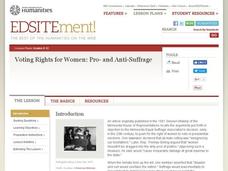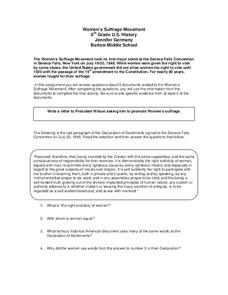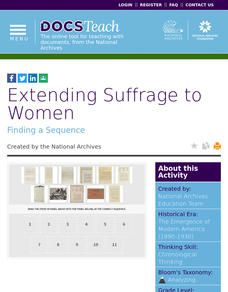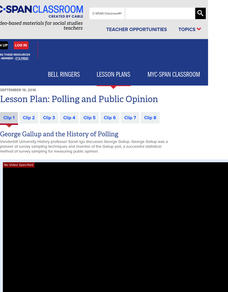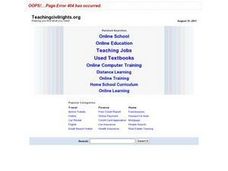Equality Teacher Resources
Find Equality lesson plans and worksheets
Showing 314 resources
Constitutional Rights Foundation
Slavery and the Electoral College
How did slavery mold the creation of the US Constitution? The final lesson in the series focuses on how slavery impacted the creation of the Electoral College. Academics learn how the Electoral College was created because Southern states...
PBS
Out of the Shadows | Black America Since MLK: And Still I Rise
Two powerful video clips launch a study of race relations in the United States after the Selma, Alabama riots, the passage of the Votings Rights Act, and the riots in Watts, California.
Crash Course
The 1960s in America
Discover the incredible change and volatility that was 1960s America with an engaging, informative video. It begins with an extensive overview of pivotal moments during the civil rights movement and the subsequent shift toward...
Illustrative Mathematics
Voting for Two, Variation 2
John won the election, but by how much more? Your learners will calculate how many votes each candidate received in order to determine the difference. Use with other lessons provided in the series to practice different variations of this...
Illustrative Mathematics
Voting for Two, Variation 3
After calculating election votes, your learners must determine how many votes the winner, John, got above 50%. This multi-step problem encourages them to think in a deeper way about what the question is asking them to find. Use with...
Curated OER
Women's Votes, Women's Voices
Students investigate Women's Suffrage by analyzing images from the past. In this equal rights lesson, students read biographical work about Emma Smith DeVoe, an activist who fought for women's rights. Students view a comic...
Curated OER
Voting Rights for Women: Pro- and Anti-Suffrage
Middle schoolers examine the arguments for and against suffrage for women in the 19th and early 20th centuries. They explore various websites, read and discuss primary source documents, develop a document from two points of view, and...
Anti-Defamation League
Martin Luther King, Jr. and Civil Rights
How far have we come and how far do we still need to go to achieve equality and full civil rights in the United States? Include a packet of materials collected in your observance of Martin Luther King, Jr. Day.
Curated OER
Women’s Suffrage Movement
Though the movement for Women's Suffrage stretched over several decades and across two centuries, the final few years were the most difficult hurdle in many ways. Use a document-based question writing exercise to make inferences about...
C-SPAN
The Electoral College and the Constitution
What is the purpose of the Electoral College? Is it antiquated, or does it have a place in today's political climate? High schoolers view a series of video clips as they analyze the parts of the United States Constitution that address...
Syracuse University
Women's Suffrage Movement
Women gained the right to vote in the twentieth century, but the fight for equality dates back centuries. Using an invitation to an 1874 suffrage convention, eager historians consider the motivations behind supporters of the suffrage...
Walt Disney Company
Elizabeth Started All the Trouble
Elizabeth Cady Stanton was a famous suffragette that paved the way for equal rights for women. Readers respond to before, during, and after reading questions based on her story. The resource is a great addition to a lesson during...
National Woman's History Museum
Susan B. Anthony: She's Worth a Mint!
A instructional activity all about Susan B. Anthony showcases the Civil Rights leader's contributions towards equality. A Susan B. Anthony coin sparks engagement. Scholars take part in a discussion that sheds light on what being an agent...
DocsTeach
Extending Suffrage to Women
Votes for women! The activity highlights the push for the Nineteenth Amendment giving women the right to vote. High school scholars learn how the Fifteenth Amendment giving African American men the right to vote helped to spark the...
DocsTeach
Suffrage Photograph Analysis
Votes for women! Young scholars use images to explore the suffrage movement and its impact on the United States. Historians work in groups or pairs to interpret the photograph, complete a worksheet, and discuss how their opinions of the...
National Woman's History Museum
Seneca Falls and Suffrage: Teaching Women's History with Comics
As part of the study of women's history, young scholars examine Chester Comix's strips about the Seneca Falls Convention and four 19th century leaders in the struggle for equal rights. After researching other elements of the Suffrage...
City University of New York
The Split Over Suffrage
Compare and contrast Frederick Douglass's and the National Women's Suffrage Association's stances on equal rights and suffrage with a series of documents and worksheets. Learners work together or independently to complete the packet, and...
EngageNY
Grade 11 ELA Module 2: Unit 2, Lesson 3
What is the distinction between rights and equality? Scholars continue their analysis of "An Address by Elizabeth Cady Stanton" using the third instructional activity from the 14-part Grade 11 ELA Module 2: Unit 2 series. Pupils complete...
C-SPAN
Polling and Public Opinion
Polls are ubiquitous in American politics, but just how reliable and equal are they? A video-driven resource helps learners discuss the question by examining what pollsters and pundits say. Extension activities involve evaluating the...
Education World
Every Day Edit - Women Get the Vote
For this everyday editing worksheet, students correct grammatical mistakes in a short paragraph about suffrage. The errors range from punctuation, capitalization, grammar, and spelling.
PBS
19th Amendment Passes Congress, Sent to States | Carrie Chapman Catt
The process of ratifying a new amendment to the United States constitution is designed to be difficult. A short video details the struggles to pass the 19th Amendment, the role Carrie Chapman Catt played in the ratification drive, and...
Curated OER
Preserving and Promoting Democracy
Eleventh graders create surveys to determine whether or not young people have or plan to vote. Using their findings, 11th graders make advertisements aimed at encouraging youth to vote.
Curated OER
What is Suffrage? Understanding the Right to Vote
Students discover one of the restrictions forced on women of the early 1900s. In this civil rights lesson, students investigate suffrage and why women were not allowed to vote in the early twentieth century. Students create a mock...
Curated OER
Looking for Heroes
Students explain the importance of the 1965 Selma-to-Montgomery Voting Rights March and the long term impact in the US of non violent civic participation.








